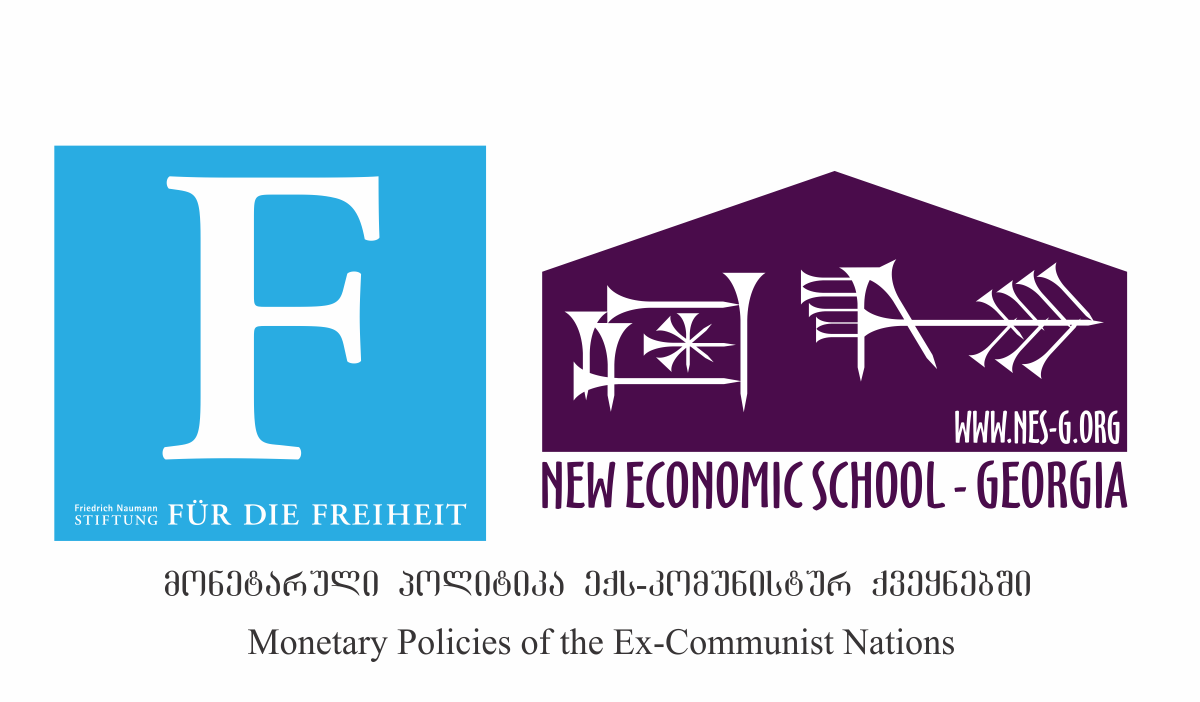This research is done by New Economic School-Georgia by financial support of Friedrich Naumann Foundation for Freedom South Caucasus office.
The views and opinions expressed in this research are those of the authors and do not necessarily reflect the official policy or position of Friedrich Naumann Foundation for Freedom South Caucasus office
Resume on Monetary Policies of the Ex-Communist Nations
This research intended to find out, evaluate and analyze the monetary systems of excommunist
nations like Armenia, Azerbaijan, Bulgaria, Estonia, Georgia, Kazakhstan,Lithuania, Montenegro, Russian during the transition and after.
The nations of transition from communism have different experiences of monetary systems and policies. Some countries choose fix international exchange rate policy, some flexible, or floating international exchange ate policy, same limited, paged floating exchange rate policy and some inflation targeting policy, therefore some of them were more successful to achieve declared goals (economic growth or limit of inflation) and some less; Also some of the Eastern European nations were
oluntarily accepted rules of the European Monetary Union and some kept so named "monetary independence" and "fiscal
overeignty", therefore economic performance was different, slow or fast, and propose of study is to measure it and find logical causalities.
Therefore, the paper has two major goals:
- To compares monetary systems and policy trends of different Ex-Communist countries and their impact on actual development;
- To offer a precise economic analysis and possible solutions for Georgian case, including legal and practical integration of block chain technology and other modern communication systems to general monetary system.
Expected results of the research:
- Condensed information about monetary policies of Ex-Communist countries;
- Explanation of the real effects of monetary policies on economic development, prosperity and social peace;
- Date based arguments to prove or disapprove assumption that if countries have sound
monetary policy economic prosperity and social conditions are higher than when monetary policy is interventionist and inflationary;
- Formulation of the best possible monetary policy recommendations for Georgia based of the Liberal viewpoint.
Findings:
1. Experienced monetary regimes:
2. General monetary freedom is rising year over year
a. According Economic Freedom of the World research www.freetheworld.com, based on following variables: Money growth, Standard deviation of inflation, Inflation: Most recent year, Freedom to own foreign currency bank accounts, world monetary freedom increases year by year.
b. Monetary freedom of all selected countries is rising
c. Monetary freedom of countries with currency board and euroization is rising higher than others.
3. Major observation
a. No countries with stabile monetary model
i. Currencies regimes are following political waives
ii. However, countries like Estonia, Lithuania, Bulgaria and Montenegro are showing more
consistency and long-term strategies in choosing momentary policy models
b. No countries with pure market based money
i. Montenegro's unilateral Euroisation, without Eurozone membership is closes alternative
ii. Second best alternative is Currency boards of Estonia, Lithuania and Bulgaria
c. No countries with pure currency board
i. Different interventions are used parallel of exchange rate maintaining:
1. General banking supervision and likening
2. Minimum reserve requirements
3. M2 based foreign reserves instead of M0
4. Credit of last resort, etc
d. No countries with permanent economic growth
i. Manipulations with currencies playas at destructive role
ii. However, countries with more monetary freedom have higher economic growth in general
iii. membership of Euro zone (that is central banking) negatively affected formercurrency board countries like Estonia and Lithuania
e. No countries with courage to give up interventionism
i. Permeant interventions from central bank or government of different sort in monetary affairs, makes hard to classify monetary regimes
ii. Modern technological findings are not very welcome from state/central banks bodies
4. Recommendations for Georgia
a. General economic freedom is essential
i. Index based evaluation is objective and nonpartisan ground for evaluation of countries performance
ii. Aim to reform toward more economic freedom and improve system in a way to rise score of valuations based on most respected international surveys:
1. Economic Freedom of the World
2. Doing Business
3. Index of Economic freedom
4. International Property Rights Index
5. World Competitiveness Index
b. Monetary freedom is fundamental
i. Aim to reform toward more sound money: Modest money grow, lowest inflation,freedom to hold accounts of any available currencies
ii. Openness to new technology and decentralization of monetary system
c. Reforms toward "natural soundness"
i. First best choice: Competing currencies
1. Legalization of all means of exchange, including debt, commodity and crypto based currencies
2. Due to current Euro integration - Euroization of taxation and bookkeeping
ii. Second best choice: Currency boards based on Euro
1. Euro as base money as sign of commitment to euro integration
2. No other targets and interventions
iii. Parallel process:
1. To keep momentary policy as sound as possible, completion must be allowed in
large scale
2. Gold and other commodity moneys
a. Parallel legalization
b. No taxes on monetary commodities
3. Cryptocurrencies
a. Parallel legalization
b. No taxes on crypto currencies
The research will be published on NESG site www.nesg-g.ge, link will be disseminated by NESG's social media unites (Facebook and Twitter).
Presentation will be delivered preliminary for FNF and NESG partners, as well as for mass media and students. However, direct posting, e-mailing and messaging/twitting will be used to reach political and financial authorities, non-governmental sector, media and academia, as well as other stakeholders -- the target groups.
Public lectures based on major findings of the research would be organized in different Universities and other institutions. In addition, researched issues will be topics of other coming activities of NESG -- Spring series 2018, various liberty schools and other lecture series. Representatives of NESG will use any chance to share insides with public via media.
Publish charts and major findings in most readable and reachable forms, including iconographies and posters.


